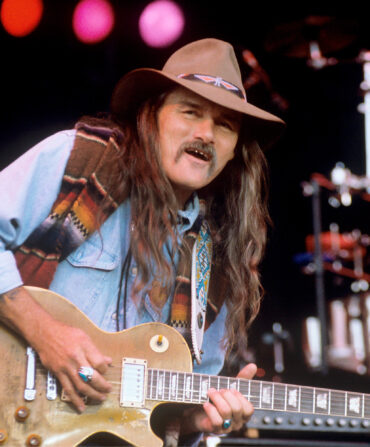On days when the singer-songwriter S.G. Goodman is at her home outside Murray, Kentucky, she likes to head out to her friend Mr. Bob’s place. A retired painting professor at Murray State University, Mr. Bob lives on a hundred-acre piece of mostly untouched land on the edge of Calloway County. Goodman helps the eighty-year-old maintain the gardens and walking trails, transplanting garlic bulbs that have been in the ground for more than forty years and clearing brush on the pathways by hand. For Goodman, who is thirty-three, what started as a job to make some extra cash during the pandemic has developed into a deep friendship, as well as a respite from an increasingly cacophonous world. She’s a self-described old soul, adding that she’s most comfortable around people significantly older than she is. She mentions another three elderly people whom she considers close friends and mentors. Goodman is also a farmer’s daughter, so working outside and manual labor are in her blood. “It really scratches an itch,” she says. “I go out there and it helps me center myself in a way that I don’t think a lot of people understand.”
It’s also a place that stimulates her songwriting. While she’s working, Goodman often comes up with witty lines that she recites into her phone. (She has a searing sense of deadpan humor.) Her first record, 2020’s Old Time Feeling, was a this-is-where-I’m-from album, a flag shoved defiantly into the Western Kentucky dirt, held together by sparse, rickety folk and her distinctive voice, at once delicate and piercing. The songs grappled with growing up in a rural Southern community and stereotypes about the region and its people, while also imploring natives to stay and build a better South. On her sublime new record, Teeth Marks, she turns the spotlight further inward with a collection of expertly crafted songs that alternate between hypnotic garage-rock vibes and ethereal, haunting acoustic tracks, with sharp lyrics about busted relationships, friends struggling with addiction, and her own sexual identity.
The tender “Patron Saint of the Dollar Store,” a rueful musing on a breakup, is, she says, the first song she’s written about a specific woman. And in the wistful “The Heart of It,” lines like “Oh honey, why would you ever take that trip down South / I let you visit for free each time I open my mouth up / And how am I gonna say to my heart / Your vacation’s over” make a compelling case that she’s become one of Americana’s richest chroniclers of the human condition. The songs are unabashedly introspective, but there’s also a palpable sense of freedom and looseness, the confidence of a woman stepping into a new phase of her life. Had it not been for the pandemic, a song like that or the soaring album closer, “Keeper of the Time,” a meditation on the lasting impacts of trauma, might not have existed. “I wanted to explore how people operate,” she says. “I felt that writing these more personal songs was the natural thing to do given how isolated I was at the time.”
A well-read, deep thinker, Goodman grew up in Hickman, Kentucky, the daughter of strict Southern Baptists, and most likely would have gone into the seminary had she been a boy. Instead, she decamped for Murray State, devouring religious texts to try to reconcile questions about her faith and majoring in philosophy, with a minor in creative writing. Eventually, she found a home in Murray’s nascent punk scene, centered around the local record store Terrapin Station and house shows at a residence dubbed the Tater Tot Mansion, where bands on tour would stop off for an extra gig and a floor to sleep on. Goodman plucked her bandmates from the Tater Tot crowd, trying to find musicians interested in playing something that didn’t require screaming vocals and ferocious guitars. “But little did they know that my sole job is to constantly annoy them,” she quips.
With touring back in full force, Goodman laments that she won’t have as much time to spend with Mr. Bob. She calls him every day to make sure he’s doing okay. She misses traipsing through the two acres of moss that serves as his front yard. “Getting to take care of the moss and doing things Mr. Bob’s way has been really therapeutic for me,” she says. “As soon as I’m done with a tour, the next morning I’m out there.”









